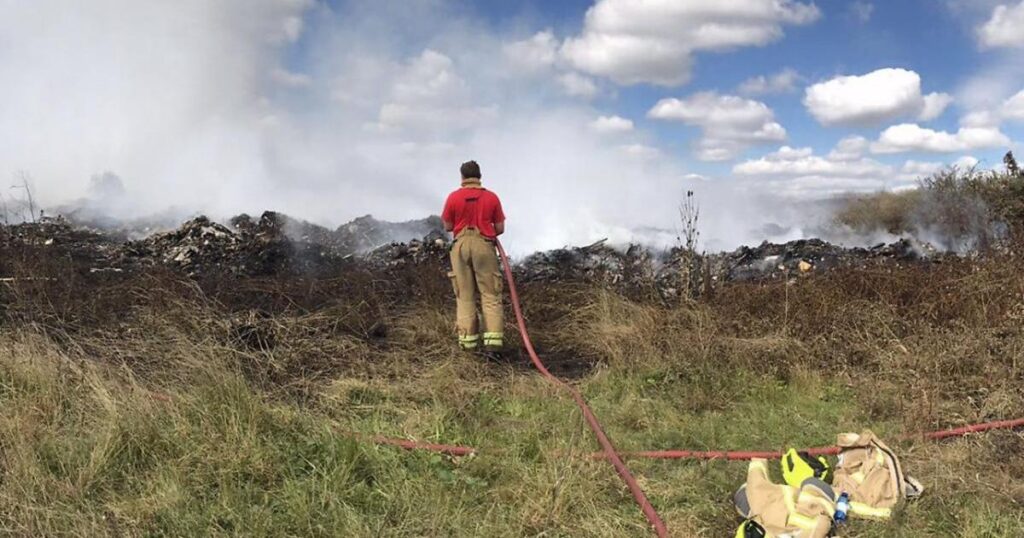Havering Council designated Arnolds Field in Launders Lane, Rainham, as contaminated on October 21 following a judicial review in June.
Residents around Launders Lane have reported stinging eyes and coughing, which they attribute to the acrid smoke blowing into their homes.
The land, which has been used as a cannabis grow and to store illegal weapons, has caught fire more than 160 times since 2022 and been the focus of a campaign by Clear the Air in Havering, headed by three local mums.
The High Court found council officers had relied on incomplete data and misunderstood legal definitions around contamination by “wrongly believing” toxic smoke did not qualify.
The council has since found the fires release harmful particulates (PM2.5), and evidence that exposure to the smoke had led to increased GP visits for those with pre-existing respiratory conditions.
Additionally, residents reported “significant disruption, anxiety, and health concerns due to the fires and smoke”.
The new designation was confirmed just hours before a council sub-committee met to scrutinise the town hall’s handling of the issue.
Ruth Kettle-Frisby, from Clear the Air in Havering, said during the meeting: “Of course residents would be better off without the fires.
“It would be insulting and disingenuous to claim otherwise, in light of what is frequently deemed by residents as ‘another summer of hell’.”
She said the group was “grateful” and “so relieved” by the new designation, but it would continue to campaign for justice for children in Rainham, who were on the “sharp end” of risk.
She said: “Time is of the essence, Havering Council. Clean air and a clean environment is a human right.”
The mother also lambasted the town hall for its “Kafkaesque” treatment of residents, in reference to the writer whose work dealt with surreal, bureaucratic nightmares and feelings of powerlessness.
Fellow speaker Shaun Newton, a member of Rainham Against Pollution, said local residents had been gravely affected by the fires.
He said one woman with COPD had been given six emergency kits during the summer, while another said she “suffocates, fights for air, has a sore throat and repeated chest infections, requiring antibiotics, steroids and an inhaler”.
The London Fire Brigade has previously said the fires were “distressing” and put firefighters at “unnecessary risk”.
Once land is legally designated as contaminated, local authorities are obligated to act.
The council says it must now consult with the landowners about how to remediate the land and, if necessary, serve a remediation notice.
Councillor Ray Morgon, leader of Havering Council, said in a statement: “This decision marks a turning point for the community living near Launders Lane and across Rainham.
“For too long, residents have suffered the consequences of fires from Launders Lane.
“By formally identifying the site as contaminated land, we are sending a clear message: we will not stand by while our residents’ health and quality of life are put at risk.”
Though opposition councillors called the lack of apparent progress “disappointing” in September, top cabinet members have said it remained a priority.
Cllr Morgon continued: “This is a very complex situation and the judicial review created new precedents.
“We have obtained professional external legal advice to make sure we are following all of the correct procedures.
“Ultimately, as the landowners, preventing the fires is their responsibility to achieve. However, we have always maintained that the council is willing to work with them to explore funding streams to resolve the matter.”
Soil analysis in November 2023 found the land contained asbestos, plastic bags, crisp packets, bricks, cans, polystyrene and asphalt.
Speaking after the meeting, committee chair Councillor David Taylor told the Local Democracy Reporting Service (LDRS): “The committee has made a number of formal recommendations, which will now be considered by cabinet.
“These include developing an action plan to detect long-term health impacts, information sharing with the Fire Brigade Union, detailed communication to residents on the health risks and how to detect conditions, and a resident engagement strategy that includes timelines.
“We have also recommended that Havering lobby the government to tighten up the laws.”
He added that the council had acknowledged there was a “significant risk of significant harm” and the committee would “closely monitor and scrutinise the council going forward”.
Councillors have also requested a formal update in January.




